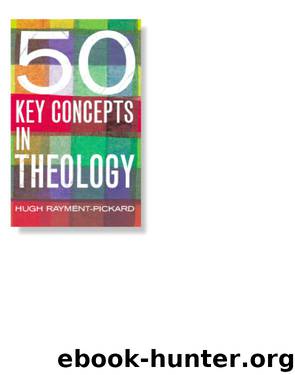50 Key Concepts in Theology by Hugh Rayment-Pickard

Author:Hugh Rayment-Pickard
Language: eng
Format: epub
Tags: religion, christian, spiritual, holy, god, prayer, faith, morals, ethics, jesus, bible, testament, theology
ISBN: 9780232528138
Publisher: Darton Longman Todd
Published: 0101-01-01T00:00:00+00:00
Myth
A form of sacred story that illuminates the truth of the human condition.
The ancient myths were sacred stories involving the gods (and possibly humans) and were set in a cosmological landscape outside recognisable history. But we now regard a myth as any story which takes on a sacred or cultic function for a particular culture or community.
Since the Enlightenment, mythic thinking has increasingly been regarded as the opposite of scientific thinking about facts and reality. It became fashionable in the modern period, for example, to demythologise the Gospels to reveal the ‘factual’ Jesus beneath the various mythic stories about him. (See ‘Biblical Criticism’.) The demythologisers rather missed the point that the myths about Jesus were intended to reveal the truth about him and cannot be disentangled from the more historically grounded parts of the Gospel narratives. Jesus cannot be treated as an historical figure separate from his mythic identity – indeed, Jesus’ mythic identity is arguably more significant than the factual story of his life. The facts give us the details, but the myth tells us Jesus’ significance and sacred meaning.
This point was made very well by C. S. Lewis who, with his friend J. R. R. Tolkein, became fascinated by the mythic dimension to the Christian story:
<DPQ>The heart of Christianity is a myth which is also a fact. The old myth of the Dying God, without ceasing to be myth, comes down from the heaven of legend and imagination to the earth of history … By becoming fact it does not cease to be myth: … We must not be ashamed of the mythical radiance resting on our theology. We must not be nervous about ‘parallels’ and ‘pagan Christs’: they ought to be there – it would be a stumbling block if they weren’t. We must not, in false spirituality, withhold our imaginative welcome. If God chooses to be mythopoeic – and is not the sky itself a myth – shall we refuse to be mythopathic?
(C. S. Lewis, ‘Myth Became Fact’, in God in the Dock)
The contrast between ‘myth’ and ‘history’ is unhelpful because the two are closely connected: histories and myths both tell stories, and most historians are shown in retrospect to be in the grip of the mythic structures of their age. Even factually truthful histories can take on a mythic status and function as cultural narratives that embody spiritual or moral meanings. This is also true for the history of the Holocaust, which now has (in addition to its factuality) a mythic status as a sacred story for our times. A myth arises when the events and protagonists in a story/history take on a religious or cosmic significance.
Adorno and Horkheimer argued in The Dialectic of Enlightenment that modern Western culture had been fuelled by an attempt to eliminate ‘primitive’ mythic ideas from human thinking and replace them with a more ‘enlightened’ and scientific consciousness. But, they argued, the idea of ‘enlightenment’ is itself just another myth: the illusion that humans can dispense with mythic narratives.
Download
This site does not store any files on its server. We only index and link to content provided by other sites. Please contact the content providers to delete copyright contents if any and email us, we'll remove relevant links or contents immediately.
The Secret Power of Speaking God's Word by Joyce Meyer(3165)
Signature in the Cell: DNA and the Evidence for Intelligent Design by Stephen C. Meyer(3124)
Real Sex by Lauren F. Winner(3006)
The Holy Spirit by Billy Graham(2941)
The Gnostic Gospels by Pagels Elaine(2522)
Jesus by Paul Johnson(2351)
Devil, The by Almond Philip C(2324)
23:27 by H. L. Roberts(2245)
The Nativity by Geza Vermes(2226)
Chosen by God by R. C. Sproul(2159)
All Things New by John Eldredge(2157)
Angels of God: The Bible, the Church and the Heavenly Hosts by Mike Aquilina(1952)
The Return of the Gods by Erich von Daniken(1927)
Angels by Billy Graham(1920)
Knowing God by J.I. Packer(1850)
Jesus of Nazareth by Joseph Ratzinger(1802)
The Gnostic Gospel of St. Thomas by Tau Malachi(1781)
Evidence of the Afterlife by Jeffrey Long(1776)
How To Be Born Again by Billy Graham(1775)
